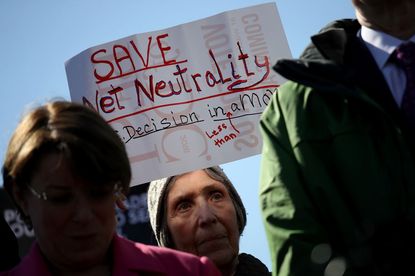Net neutrality is officially dead in the United States (for now)


The Federal Communications Commission's 3-2 decision to scrap net neutrality — the idea that all legal internet traffic must be treated the same by internet service providers — takes effect Monday. Killing net neutrality is a victory for FCC Chairman Ajit Pai, who wrote the rules and pushed them through with the help of the other two Republican FCC commissioners, and for ISPs. Without net neutrality, critics warn, giant corporations like Verizon and Comcast can throttle traffic to sites they don't own or partner with, or give customers who pay more better connections to services like Netflix. The Senate passed a bill in May reinstating net neutrality, but the House is not expected to take it up.
The fight now moves to federal court, where some net neutrality proponents are suing to overturn Pai's decision on the grounds that it was arbitrary and without justification. Telecoms are mulling legal action against Oregon, Vermont, and Washington state, which have all passed laws preserving net neutrality at the state level; California lawmakers are pushing through a similar law, and six other governors have tried to enact net neutrality through executive orders.
Telecoms insist they have no current plans to throttle traffic to certain sites. "We're all going to wake up on Monday, and we're all going to be able to stream cool shows off Netflix or Hulu or YouTube," said Jonathan Spalter, the leader of the trade group USTelecom, speaking in the lingo of youth. Gene Kimmelman, the president of public interest group Public Knowledge, said the end of net neutrality and approval of AT&T's purchase of Time Warner — a judge is set to rule either way on Tuesday — "could be a one-two punch to consumers and online competition. ... The combination of no net neutrality and video consolidation creates new bottlenecks that empower the traditional media industry to raise prices and limit online competition."
Subscribe to The Week
Escape your echo chamber. Get the facts behind the news, plus analysis from multiple perspectives.

Sign up for The Week's Free Newsletters
From our morning news briefing to a weekly Good News Newsletter, get the best of The Week delivered directly to your inbox.
From our morning news briefing to a weekly Good News Newsletter, get the best of The Week delivered directly to your inbox.
Sign up for Today's Best Articles in your inbox
A free daily email with the biggest news stories of the day – and the best features from TheWeek.com
Peter has worked as a news and culture writer and editor at The Week since the site's launch in 2008. He covers politics, world affairs, religion and cultural currents. His journalism career began as a copy editor at a financial newswire and has included editorial positions at The New York Times Magazine, Facts on File, and Oregon State University.
-
 US charges Indian tycoon with bribery, fraud
US charges Indian tycoon with bribery, fraudSpeed Read Indian billionaire Gautam Adani has been indicted by US prosecutors for his role in a $265 million scheme to secure solar energy deals
By Peter Weber, The Week US Published
-
 Boeing machinists approve contract, end strike
Boeing machinists approve contract, end strikeSpeed Read The company's largest union approved the new contract offer, ending a seven-week strike
By Peter Weber, The Week US Published
-
 US economy still strong in final preelection report
US economy still strong in final preelection reportSpeed Read It grew at a solid 2.8% annual rate from July through September
By Peter Weber, The Week US Published
-
 Boeing machinists reject deal, continue strike
Boeing machinists reject deal, continue strikeSpeed Read The rejection came the same day Boeing reported a $6.2 billion quarterly loss
By Peter Weber, The Week US Published
-
 Ports reopen after dockworkers halt strike
Ports reopen after dockworkers halt strikeSpeed Read The 36 ports that closed this week, from Maine to Texas, will start reopening today
By Peter Weber, The Week US Published
-
 Empty-nest boomers aren't selling their big homes
Empty-nest boomers aren't selling their big homesSpeed Read Most Americans 60 and older do not intend to move, according to a recent survey
By Peter Weber, The Week US Published
-
 Brazil accuses Musk of 'disinformation campaign'
Brazil accuses Musk of 'disinformation campaign'Speed Read A Brazilian Supreme Court judge has opened an inquiry into Elon Musk and X
By Rafi Schwartz, The Week US Published
-
 Disney board fends off Peltz infiltration bid
Disney board fends off Peltz infiltration bidSpeed Read Disney CEO Bob Iger has defeated activist investor Nelson Peltz in a contentious proxy battle
By Rafi Schwartz, The Week US Published


